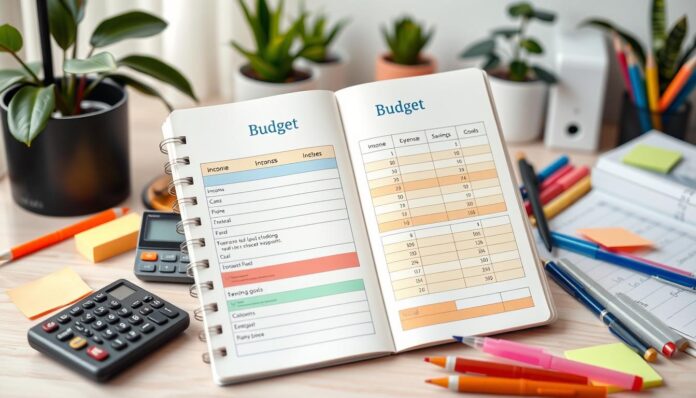Imagine planning a family holiday with care, making sure you have enough for flights, accommodation, and fun. Every pound is carefully thought out to meet all your needs and wants. This careful planning is similar to zero-based budgeting, where every penny is given a purpose from the start. It’s not just about tweaking last year’s budget. It’s about rethinking what’s important and why before spending.
Zero-based budgeting, introduced by Peter Pyhrr in the late 1960s, promotes accountability. It makes us question our spending and align it with our goals. Whether you’re planning your fitness budget or a business strategy, this method helps make smart financial choices. Let’s explore how zero-based budgeting can help us manage our money better!
Table of Contents
Key Takeaways
- Zero-based budgeting starts from a clean slate each cycle, necessitating collaboration across departments.
- This budgeting technique requires significant time investment for thorough justification of every expense.
- Applying zero-based budgeting effectively offers high cost efficiency compared to traditional methods.
- It encourages a focus on short-term revenue, which can overshadow long-term investments.
- To optimise outcomes, integrating zero-based budgeting with other methods can balance immediate and strategic goals.
- Keeping a close eye on spending is essential for successful implementation of this method.
- Setting aside funds for unexpected costs can help tackle the challenges posed by variable expenses.
What is Zero-Based Budgeting?
Zero-based budgeting (ZBB) is a new way to handle money. It makes you think about every expense from the start. Unlike old ways, ZBB starts with zero, helping you decide what’s really important.
It began in the 1970s by Peter Pyhrr. ZBB breaks down spending, making finances clearer. It promotes being careful with money and making better choices.
Starting with ZBB needs careful planning. You must set goals and check your spending. It might take time and effort, but tools like spreadsheets help. Even people like Beth Fuller have paid off big debts using this method.
| Advantages of Zero-Based Budgeting | Challenges of Zero-Based Budgeting |
|---|---|
| Cost savings | Time-consuming to set up |
| Enhanced efficiency | Complexity in tracking |
| Increased accountability | Resource allocation difficulties |
| Flexibility and adaptability | Initial disruption during implementation |
ZBB believes every penny should have a reason. It makes you think about spending more carefully. This can lead to financial stability over time.
Zero-Based Budgeting Explained: Understanding the Process
The zero-based budgeting process changes how we plan finances by starting from scratch. It ignores all past budget plans. This lets organisations build a budget that meets today’s needs, not just yesterday’s spending.
It makes them look at every part of their work to find out what’s really needed. They must explain why they need certain expenses.
Starting from a Zero Base
Starting from zero means every department has to really think about what they do. They can’t just keep spending the same as before. They need to check if what they do matches their goals.
This careful planning helps use resources better. It means money goes to the things that really help the company succeed.
Justifying Every Expense
Every expense needs to be explained at the start of budgeting. This makes sure only the really important costs get approved. It helps cut down on spending that’s not needed.
By doing this, companies can work better and achieve their financial targets. They can change their spending plans as needed, which helps them do even better.
The zero-based budgeting method makes sure money is used wisely. It helps businesses not just get by, but do well in a tough market. More and more people are interested in this way of budgeting. For more on budgeting, check out this resource.
The Zero-Based Budgeting Process
Starting the zero-based budgeting process can really help us manage our money better. It means we make a budget from the ground up, not just using last year’s numbers. This way, we have to explain every expense, making sure our money goes where it’s needed most.
Creating a Budget from Scratch
First, we look at our financial situation. We figure out our income and fixed costs. Once we understand these, we can start planning.
Evaluating Costs and Needs
Then, we check our expenses carefully. We look at both must-haves and nice-to-haves. This helps us make sure we’re spending wisely, not on things we don’t really need.
| Evaluation Aspect | Description |
|---|---|
| Income Assessment | Identifying all sources of income before expenditures are outlined. |
| Fixed Expenses | Documenting necessary non-variable costs like rent and salaries. |
| Variable Costs | Analysing costs that fluctuate, such as utilities and raw materials. |
| Justification | Ensuring each line item within the budget is necessary and strategically important. |
This detailed check on our spending is key to a successful zero-based budget. It helps us be more careful with our money. This way, we can make sure our spending matches our goals. For more tips on budgeting, check out budget management skills.
Benefits of Zero-Based Budgeting
Zero-based budgeting (ZBB) offers many benefits for organisations looking to improve their financial management. One key advantage is better cost management. This method makes every expense justify itself, pushing teams to carefully review their spending.
By finding ways to cut down on unnecessary costs, ZBB helps align financial resources with strategic goals. This ensures that money is spent wisely and effectively.
Enhanced Cost Management
For businesses to thrive in a competitive world, managing costs well is essential. Zero-based budgeting helps by making sure every budget line is thoroughly checked. This means cutting out waste and focusing on spending that brings the most value.
This approach also makes it easier for companies to adapt quickly to market changes. It boosts their financial flexibility and agility.
Increased Accountability and Focus
Zero-based budgeting increases accountability in budgeting. Managers and teams must explain their financial plans clearly. This creates a sense of ownership and responsibility.
By linking spending to strategic goals, teams focus on adding value. This leads to better resource allocation and a more strategic approach to spending.
In short, adopting zero-based budgeting helps organisations manage costs better. It also builds a culture of accountability and focus. This leads to more efficient operations and better financial health.
| Benefit | Description |
|---|---|
| Enhanced Cost Management | Thorough scrutiny of every expense promotes efficiency and resource optimisation. |
| Increased Accountability | Managers hold responsibility for budgeting decisions, fostering a culture of ownership. |
| Strategic Focus | Expenditures align with organisational goals, ensuring investments generate value. |
| Better Resource Allocation | Redundancy identification leads to more effective use of financial resources. |
Zero-Based Budgeting Template and Tools
To start zero-based budgeting, you need the right tools and templates. Budgeting apps help keep your finances in check. You Need a Budget (YNAB) is a great choice for tracking expenses and making sure every pound is used wisely. These zero-based budgeting tools make it easier to stay organised and focused on your financial goals.
Utilising Budgeting Apps
Budgeting apps make it easy to manage your money. They help you set and reach your financial goals. With these apps, you can adjust your budget as your money situation changes.
They help you understand where your money comes from and where it goes. This way, you can track and manage your finances better.
Creating a Personalised Budget Template
Creating a budget template that fits your needs is also key. Start by listing all your income and categorising your expenses. You can use budgeting rules like the 50/30/20 rule to guide you.
This detailed approach helps you avoid spending more than you earn. It keeps you aware of your financial situation.
Using these methods helps you stay in control of your finances. It promotes accountability and helps you track your expenses better. The right tools and templates lead to better financial health by focusing your spending.
Zero-Based Budgeting Examples
Zero-based budgeting (ZBB) is useful for both personal finance and business. It helps by allocating every penny wisely. This way, people and companies can find new ways to save and be more efficient.
Personal Finance Application
For personal finance, ZBB shows the value of careful money management. Imagine a family with £3,000 monthly income. They must list out all their expenses, like rent and food, until every pound is used. This method helps stay disciplined with money and understand what’s most important.
Business Budgeting Scenarios
Businesses also gain a lot from zero-based budgeting. Managers must explain each planned expense. For example, a company might cut its ad budget from £10,000 to £3,000 by reviewing it closely. This careful look can find big savings and help meet company goals.
Startups find zero-based budgeting very helpful. They don’t have past budgets to follow. This method helps them use money well and meet their big goals. It also makes spending clearer and more efficient. For more on money planning, check out financial planning resources.
How to Implement Zero-Based Budgeting
Starting zero-based budgeting needs a careful plan. It’s about setting up for success from the beginning. First, gather all the financial data you need. This creates a strong base for your budget.
Then, follow a step-by-step plan. Make sure each step is well thought out and done right.
Step-by-Step Approach
The journey to zero-based budgeting has several stages:
- Define objectives: Clearly state what you want to achieve with your budget. This helps everyone work together.
- Gather data: Get all the financial details, like past spending and what you already have.
- Establish categories: Sort expenses into clear groups. This makes it easier to see what you’re spending on.
- Justify expenses: Make sure every expense is explained. It should match your goals.
- Engage teams: Get different departments involved. This builds teamwork and shared responsibility.
- Review regularly: Check how well you’re sticking to the budget. Make changes when needed.
Involving Stakeholders and Teams
Getting stakeholders involved is key to zero-based budgeting success. This means:
- Encouraging participation: Get team members from various departments to share their views.
- Enhancing communication: Make sure everyone knows their role. This avoids confusion and ensures everyone is accountable.
- Fostering a culture of ownership: Let teams manage their budgets. This boosts their engagement and commitment.
Working together helps allocate resources better. It makes budgeting more efficient. When everyone justifies their spending, it raises awareness of cost control. This leads to better budgeting results.
Effective zero-based budgeting sets a solid base for managing finances well. It’s about making smart use of resources.
Zero-Based Budgeting Best Practices
Using zero-based budgeting can really help with managing money in any organisation. It’s all about being flexible. This lets teams change plans as needed and make sure they use their resources well.
Maintaining Flexibility
Being able to change budget plans quickly is key. By checking costs often and matching them with goals, businesses can work better. Teams should look at every expense again each time they budget. This way, they make sure every penny is worth it.
Regular Reviews and Adjustments
Having regular budget checks is a top tip for zero-based budgeting. These reviews catch problems early and help make quick fixes. They also help make choices that match the company’s big goals.
Creating a space where feedback is valued helps improve budgeting. For more on managing budgets well, check out detailed budget strategies.
Zero-Based Budgeting vs Traditional Budgeting
Choosing between zero-based budgeting and traditional budgeting shows clear budgeting differences. It’s key for companies aiming to manage their finances well. Traditional budgeting builds on past spending, needing only small tweaks. On the other hand, zero-based budgeting (ZBB) starts from scratch each time, making every expense count.
Understanding the Key Differences
The main budgeting differences are in how they justify spending. Traditional budgeting lets old projects keep going without question. But ZBB makes every cost and project justify itself. This leads to better financial planning.
ZBB also makes budgeting more flexible. It lets companies quickly adapt to new needs. This is because every decision is based on its importance.
Advantages of Zero-Based Budgeting
ZBB has many ZBB advantages, like better use of resources. It helps companies focus on what’s really important. This way, they can be more efficient and accountable.
It also makes sure spending matches strategic goals. This pushes companies to think differently about their money. It encourages innovation and keeps finances aligned with goals.
Zero-Based Budgeting Advantages for Personal and Business Finances
Zero-based budgeting (ZBB) is great for both individuals and businesses. It starts from scratch each time, making sure every penny is accounted for. This helps save money and focus on important goals.
This method makes things more efficient. It also helps understand where every pound goes.
Cost Savings and Efficiency
The main benefit of ZBB is saving money. It makes sure every expense is justified. This helps cut down on unnecessary spending.
- Reduced budget bloat through a meticulous examination of historical costs.
- Enhanced control over operational expenses, ensuring funds are allocated effectively.
- Streamlined operations by aligning spending with true organisational needs.
ZBB makes spending more efficient. It helps organisations adapt quickly to changes without wasting money.
Aligning Spending with Strategic Goals
Another big plus of ZBB is aligning spending with goals. Every expense must support the organisation’s main aims. This ensures money is spent where it matters most.
- Clear visibility into financial decisions and their impact on strategic outcomes.
- A focus on value-centric metrics that drive long-term growth.
- Unbiased evaluations of proposals, treating each line item as a fresh opportunity.
ZBB helps focus on spending that brings good returns. It builds a strong base for ongoing improvement in finances.
Conclusion
Zero-based budgeting is a powerful way to manage money. It makes you think about every expense and how to use resources wisely. This approach helps people and businesses see where they can save money.
Even though it takes time and might face some opposition, its benefits are clear. It helps find ways to do things better and grow in a sustainable way.
To make zero-based budgeting work, you need to set clear financial goals. This method is not for everyone but it’s worth considering. It helps make better financial choices and supports financial health.
More companies and governments are starting to use zero-based budgeting. It offers useful insights and practical ways to manage money better. Looking back, it’s clear that zero-based budgeting can make financial management more efficient and effective.
FAQ
What is zero-based budgeting?
Zero-based budgeting (ZBB) means every expense needs to be explained from the start of each budget period. It doesn’t just add a bit more to last year’s budget.
What are the benefits of zero-based budgeting?
Zero-based budgeting helps manage costs better and makes sure spending matches goals. It also makes sure money is used wisely, leading to better financial health.
How do I implement zero-based budgeting?
Start by getting all financial data right. Then, follow a clear plan, get everyone involved, and assign roles. This helps everyone work together and stay on track.
Can zero-based budgeting be used for personal finance?
Yes, it can. For personal finance, use it to plan how to spend each month. Make sure every pound has a job, from bills to fun money.
What tools can assist with zero-based budgeting?
Tools like You Need a Budget (YNAB) can help. Also, custom budget templates fit your financial situation perfectly.
How does zero-based budgeting differ from traditional budgeting?
Zero-based budgeting asks for reasons for every expense at the start. Traditional budgeting just adds a bit more to last year’s budget.
What are some best practices for zero-based budgeting?
Keep things flexible and review budgets often. Make sure everyone is accountable and knows about money matters.
Could you provide an example of zero-based budgeting in a business context?
In business, each department must explain their spending plans again. This ensures resources are used well and meet company goals.
How do zero-based budgeting advantages improve financial health?
It helps by cutting down on waste and saving money. It makes sure every penny is spent on something important for the future.






